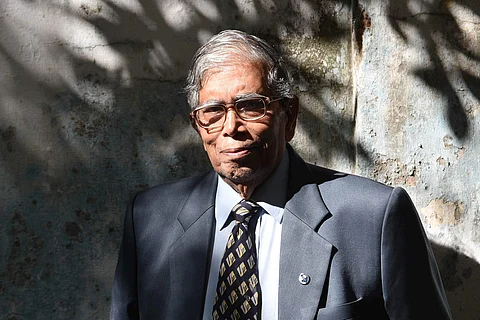

When the poet Sitakant Mahapatra welcomed fellow-poet Gulzar to his house in Bhubaneswar, the latter exclaimed, “Do you live in a house or a library?” That Mahapatra is a revered poet and literary critic in Odia and English is a known fact, but as he recalled this incident involving his “dear friend” Gulzar, we truly understood the kind of love for all things literary that his heart holds. It is because of this love for verse, word and language that his pen still spouts poems.
Back when he was pursuing his Master’s in Political Science from Allahabad University, this Cuttack-born poet made a bold promise — to write poetry only in Odia, a promise which still holds true. We call it bold because back in the day, that would have limited his readership. But as they say, there is no limiting the greats. He went on to win a slew of awards and honours, including the Sahitya Akademi Award, Padma Bhushan and the most recent, Padma Vibhushan, which led to a more widespread translation of his works. Particularly, in all Indian languages and several foreign languages too, including Hebrew, Japanese, Danish and many others. Though he has written travelogues (“though I am very well-travelled, I won’t call myself a globetrotter. I have been to every continent except South America,” he quips) and critical essays in English and Hindi, his heart still beats for Odia.
The poetry within
Though it’s a rhetorical question, we ask him why it is so, while being seated beside him one cold morning in Hyderabad. Given his vast body of work and service, it was of little surprise that he had come to the City of Nizams to receive an award for his remarkable service to humanity and literature. “Poetry comes from the soul and it can be written in a language that you are born into or grow up with. I suppose that is why we call it a mother tongue, because it is intimate, like a mother. And that language is Odia for me,” says the 81-year-old. And as and when he said this, I make myself comfortable on the couch, with a cup of piping hot green tea cupped between my hands for warmth, knowing that this is going to be one long and beautiful conversation about literature and languages.
Books for the win
After teaching at Utkal University, he joined the IAS and has held many prestigious positions, both in Odisha government and the Government of India. Some of which are Secretary, Ministry of Culture, Government of India, where he chaired the committee of linguistic experts in 2003 to advise the government on including more languages as official ones and many others. Probably, he guessed by our expression that we were going to ask about what happened to his poetry during those years because the next thing he said was, “Civil Services was my profession through these years, but poetry remained my passion.” He continued to acquire a number of books. His eyes lit up like a child as he spoke about how he purchased French novelist André Malraux’s autobiography Anti-Memoirs for six shillings back in the day. “Can you believe it, just six shillings!,” he exclaims with the same excitement he must have shown back then. Perhaps why he declares that books, the physical kind, which one can hold, smell and feel, will always hold a special place in his heart. This is a rare statement in this age of the Kindle and ebooks. Which is why, though he loves watching television, he makes it a point to give more time to his first love, books.
Poetry on point
One of the major areas of work for this award-winning writer has been with the Santhals, one of the major tribal groups of India. “In fact, I used to converse with them in my broken Santhali without hesitation,” recalls Mahapatra. He has even written many anthologies about the tribe. He, in fact, has picked up many languages like Hindi, while serving in New Delhi and French, which he even pursued a Diploma in. “When I travelled to France with a Eurail pass, I spoke to a few people in French and they thought I was extremely fluent in it,” he laughs and then adds, “But language is something you forget when you don’t use.” Talking about languages, he credits his translators for his international reach. And because we already asked him a rhetorical question, we ask him another redundant one. Does he still write? The answer is one that doesn’t surprise us as much as it fills our hearts with a warm and fuzzy feeling. He says, “Of course, that’s what keeps me alive.” How’s that for a life-long obsession with literature?
The awards this poet has won:
- 1974
Sahitya Akademi Award
-1993
Jnanpith Award
- 2002
Padma Bhushan
- 2011
Padma Vibhushan
- 2017
Tagore Peace Award
